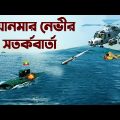lal neel asman by haydar ali, Bangladesh Navy.
Indigenous Shipbuilding has been a century old tradition in this region. It is one of the early industries developed in Bengal based on its tradition of building boats and sea going vessels. Many countries of Asia and Europe used to regularly buy ships built at Chittagong. Ibna Batuta came to Bengal in the 14th century and went back in a wooden ship built in a dock located at Sonargaon, Dhaka. Such historic ships are being preserved in European Museums. According to the European traveler Caesar Frederick, Chittagong was the centre of building ocean-going vessels during the middle of the 15th century. During the 17th century, a fleet of ships of the Sultan of Turkey was built at Chittagong. During the Mughal period, Bengal is said to have taken the lead in building ship and boats. The Mughal Naval Force had a large number of ships built at Chittagong. The British Navy used warships built at Chittagong in the famous Battle of Trafalgar in 1805. In 1818 the wooden hull frigate Deutschland was built in Chittagong and delivered to German Navy. During the first half of the 19th Century, the shipyards at Chittagong built ships up to 1000 DWT.
The nucleus of BN was formed in June-July 1971 when a handful of courageous sailors under the leadership of Rahmatullah and A W Chowdhury (later promoted to commodore) defected from Toulon, France, where they were undergoing submarine training. The Bangladesh government in exile, on the advice of the defectees, planned to form a Naval Commando Force. About 357 freedom fighters were recruited from various training camps to join the Naval Commando. At the end of their training, C –in –C Bangladesh Force Colonel M A G Osmani in a brief deliberation to the commandos declared the group as the “First representative of Bangladesh Navy” and he informed the commandos that “time frame of independence would depend on their success”.
The Naval Commando comprising of these young men carried out attacks on merchant ships with Limpet Mines in Chittagong and Mongla (Chalna) maritime ports. They made 8 groups which was combination of 8 sailors and 500 other members that carried out ‘Operation Jackpot’ successfully in different sea and river ports destroying 26 ships of the enemy and neutralised the sea routes. The Naval Commando inflicted a crippling damage on the East Pakistan ports, inland waterways and shipping. They also caused serious damage to the Pakistani war efforts by sinking ships or damaging jetties and immobilizing of ports and navigable channels. A vast amount of international shipping was kept away from East Bengal ports in spite of the high rates of compensation announced by the Government. The Naval Commando held East Pakistan in a state of siege in the highest traditions of war at sea and that too without possessing a single oceangoing vessel. In four months, the frogmen attained their aim of closing the major ports of Chalna/Mongla and Chittagong, which paradoxically was mined by the departing Pakistani authorities using mines almost on the day prior to their surrender. There is little doubt that the naval commando frogmen accelerated the liberation of Bangladesh. The highly motivated frogmen, mostly students, did not seek any kudos or political recognition or reward except the liberation of there beloved ‘Sonar Bangla’. Freedom fighters from Mozambique, Libya and Somalia eagerly sought the details of these unique riverine naval commando operations of Bangladesh.
Besides commando operations, two pilot boats were converted into riverine patrol craft in September 1971 at Garden Reach Shipyard, Kolkata and named as “PADMA” and “PALASH”. These craft were manned by 49 valiant Bengali sailors under the command of Indian Navy Officers and deployed in the river routes of Sundarbans. In November 1971, Padma and Palash carried out mining in Zulfiquar channel and destroyed four Pakistan merchant ships and one Patrol Craft. On 10 December 1971, PADMA and PALASH while proceeding to seize control of Chalna port and Naval Base Titumir, came under air attack near Khulna Shipyard and fire engulfed both the ships. Freedom fightersfrom both the ships jumped into river to save their lives. Engine Room Artificer Ruhul Amin valiantly fought to save his ship and embraced martyrdom. Govt. of the People’s Republic of Bangladesh honoured him with the highest gallantry award BirSreshtho for his patriotism and supreme sacrifice for the country. Nation will always remember BirSreshthoShaheedRuhul Amin with great admiration and pride. There were many other heroes whose names have gone into oblivion as there had not been a true record of naval commando actions.








